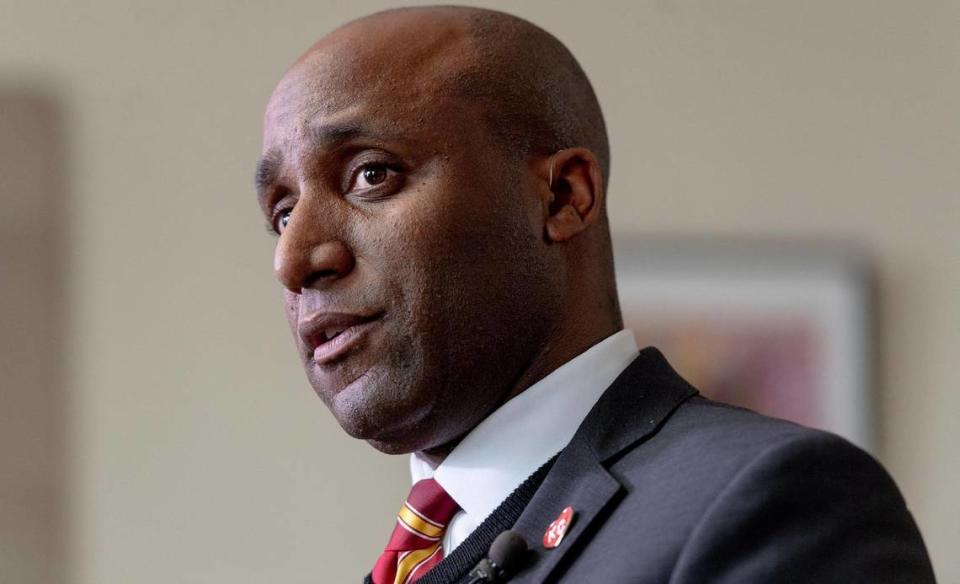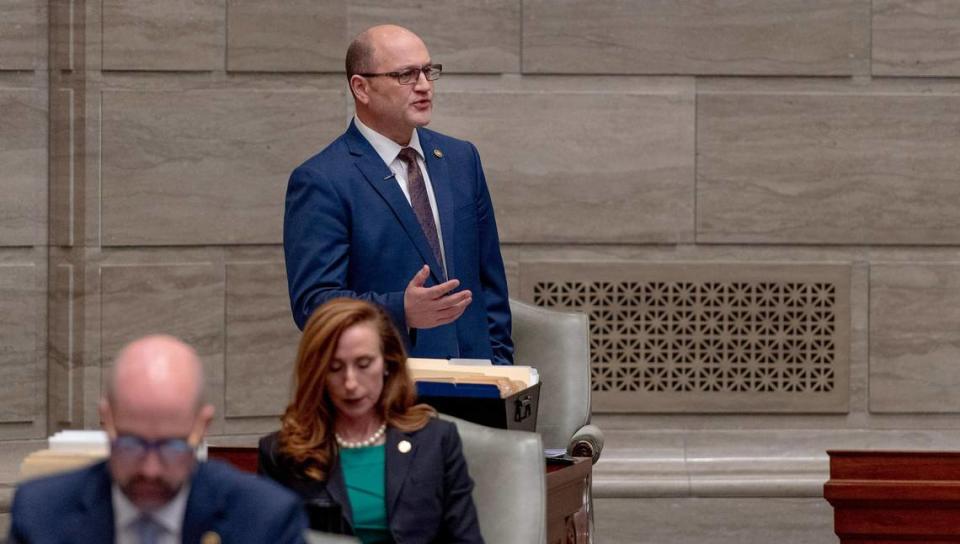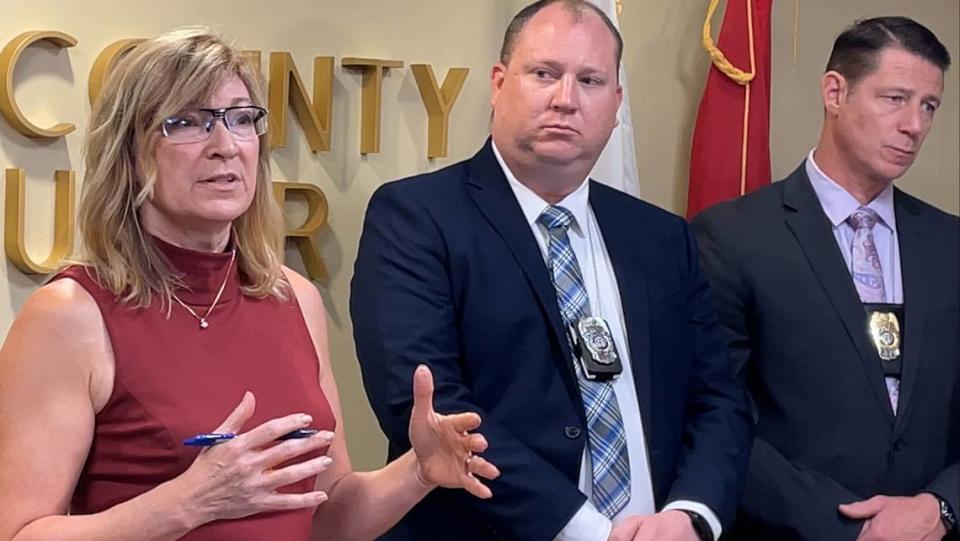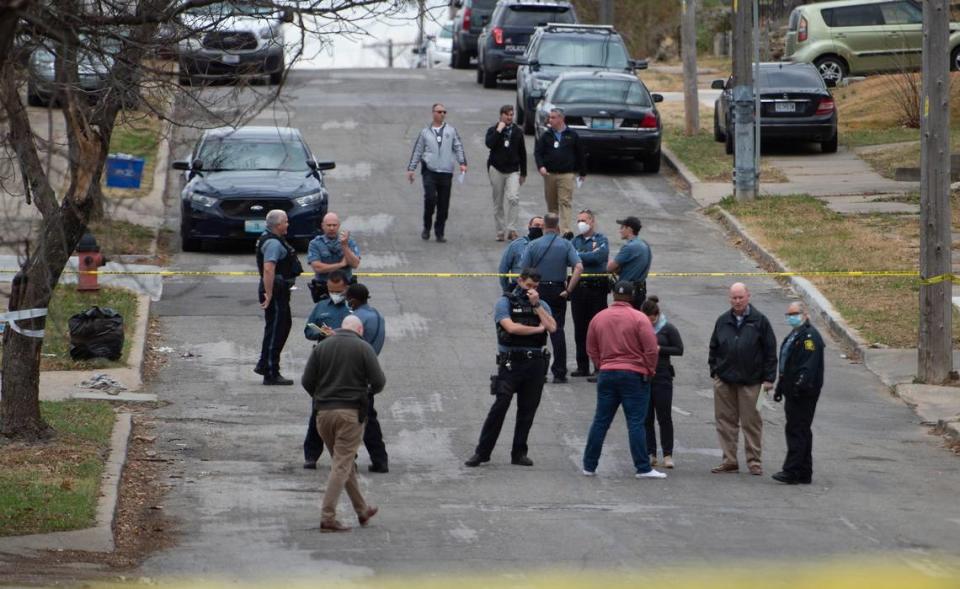Kansas City is ‘awash in firearms’ but Missouri bans local leaders from regulating guns
- Oops!Something went wrong.Please try again later.
As Kansas City confronts a rising tide of killings this year, one tool remains out of bounds for local leaders and law enforcement: restrictions on guns.
For nearly 40 years, the Missouri General Assembly has retained for itself the sole authority to regulate firearms. The closely guarded power has kept city councils and county commissions around the state from imposing limits on concealed weapons or requiring the registration of handguns.
But as the toll of gun violence has mounted in Kansas City and St. Louis in recent years, that power faces a growing challenge from anti-violence advocates, local leaders and others frustrated by what they say is a major obstacle to combating the daily rhythm of shootings in the two cities.
The Republican-controlled legislature’s sweeping control over gun laws – and its steady relaxation of restrictions – has spurred a nascent campaign to amend the Missouri Constitution to restore the ability of the state’s two biggest cities to set rules limiting guns. The effort, called Sensible Missouri, could pose the most serious threat to Jefferson City’s grip on firearms policy in recent memory.
Kansas City Mayor Quinton Lucas and the mayors of St. Louis, Columbia and Springfield are scheduled to meet in Kansas City on Thursday “to discuss collective solutions to gun violence and state preemption laws,” his chief of staff, Morgan Said, wrote in an email. Lucas is also scheduled to meet with Sensible Missouri on Wednesday.
“I think the community is awash in firearms and largely firearms that are in place where people either are drinking or looking at retaliation, are looking at any number of issues,” Lucas told reporters Friday. “And I think it is clear, not just from Kansas City, but if you talk to mayors, prosecutors and police officers in any major city in the country, these are ingredients that have led to more incidents like these.”
Sensible Missouri in late June submitted three initiative petitions, all of which would grant Kansas City, Jackson County, St. Louis and St. Louis County latitude to approve local firearms ordinances. Two of the versions would allow all counties to set their own rules, either by county leaders or a countywide vote.
The proposals come as Kansas City grasps for solutions to gun violence in the metro. The city marked its 100th homicide for the year last week, according to data tracked by The Star, well ahead of the roughly 80 homicides recorded at this time last year. High-profile killings – including a mass shooting that killed three and injured six others late last month at 57th Street and Prospect Avenue – have only increased public pressure.
Still, when it comes to the guns themselves, local leaders say their hands are often tied.
“I fully support cities having the ability to come up with responsible limits to gun access in any number of places … we continue to fight the Missouri legislature about firearms on buses and transit, which I think creates substantial concern,” Lucas said.
Lucas made the comments during a news conference with Jackson County Prosecutor Jean Peters Baker announcing murder charges in a mass shooting at Klymax Lounge in May that killed three people and injured two others. Baker and Lucas noted state law allowed guns at the nightclub.
Lucas and others seeking local control over guns are fighting a decades-long shift in Missouri in favor of ready access to firearms that’s swept away nearly all major restrictions.
The General Assembly in 1984 passed a bill preempting the authority of local governments to restrict guns except in limited circumstances, such as banning their discharge in city limits. The arguments for and against fell along similar lines to the gun debate today.
During a House committee hearing, proponents said the legislation would allow “uniformity” on firearms across the state. Opponents charged that “what is considered acceptable in rural areas may not be acceptable in urban areas,” according to an official legislative summary of the hearing.
Missouri voters in 1999 narrowly rejected an early form of concealed carry, only for the General Assembly to impose it in 2003 over the veto of Democratic Gov. Bob Holden. In 2007, lawmakers repealed a law requiring a permit to purchase handguns – a change that led to 49 to 68 additional firearms deaths each year in Missouri over the following decade, Johns Hopkins researchers found.

Local leaders want another tool
The legislature has continued to loosen restrictions on guns in recent years.
Lawmakers have lowered the conceal carry age to 19, allowed concealed weapons without a permit and even passed the Second Amendment Preservation Act, an audacious attempt to prohibit the enforcement of certain federal firearms laws in Missouri. A federal judge struck down the law earlier this year; the decision has been appealed.
“I don’t think that they should have more latitude to restrict Second Amendment rights,” state Sen. Denny Hoskins, a Warrensburg Republican who is running for Missouri secretary of state, said of local governments.
“The solution that needs to happen is they need to start prosecuting criminals and putting violent criminals behind bars.”
Hoskins’ comments echo a common view advanced by Missouri Republicans, that prosecutors in Democratic-leaning areas are too often soft on crime. Former St. Louis Circuit Attorney Kim Gardner, a Democrat, resigned in May after Missouri Attorney General Andrew Bailey, a Republican, initiated court proceedings to remove her. Gardner, the city’s first Black circuit attorney, had faced fierce GOP criticism during her turbulent tenure.

Republicans also often emphasize the importance of strong police forces. Gov. Mike Parson last year signed a measure requiring Kansas City to spend more on its police force, even as the department remains the only one in Missouri under state control. Voters statewide then approved a constitutional amendment this fall legalizing the increase.
“As the initiative petition is still in the early preliminary stages, we do not have a comment other than Governor Parson is a strong and proud supporter of the Second Amendment and would not support any measure that he views weakens law-abiding Missourians’ right to bear arms,” Parson spokesperson Johnathan Shiflett said in a statement.
Some on the frontlines of anti-violence efforts see irony in Republicans who are quick to point out and campaign on the prevalence of violence in Kansas City and St. Louis while keeping limits on guns off the table.
“It always seems as though we’re fighting with one hand behind our back, or at least at a disadvantage,” said Damon Daniel, president of the Kansas City-based AdHoc Group Against Crime. “That’s always been the case and it’s unfortunate that’s the way that politics has played out in our country.”
For the past five years, state Rep. Richard Brown, a Kansas City Democrat, has introduced legislation that would return authority over firearms to local governments. He said it’s never received a hearing but that he plans to offer it again next year.
“My colleagues’ thinking is that the good guys are going to pull their guns out, shoot the bad guys. But that’s not what happens,” Brown said.
Proponents of returning control over gun policy to local governments say there are a variety of rules cities and counties could enact to have some effect on violence. Some say officials could implement new handgun permit requirements, mimicking at a local level the repealed statewide rules.
Others say guns have so thoroughly proliferated society that permits may be of limited use. Instead, they say ordinances requiring guns to be safely stored or requiring owners to report stolen or missing guns could make a difference.
Jennifer Joyce, a Democrat who served as St. Louis circuit attorney from 2001 to 2016, said she sensed a growing availability of guns and more homicides of young people over her tenure as firearms restrictions were rolled back. She’s now a principal at the Vera Causa Group, which provides leadership training and consulting services to prosecutors.
“I think that horse has left the barn” on handgun permits, Joyce said, adding that she focuses on measures like requiring parents to keep guns locked.
“Any kind of legislation that has the word gun in it gets a lot of opposition” because if it’s applied statewide, she said, “it’s going to affect people who are living in a different reality than we are.”
The stark divide between the rural and urban areas of the state, and the insistence by gun rights supporters of uniform access, has driven frustration among local leaders that they don’t have the tools they need to rein in violent crime.
Baker, the Jackson County prosecutor, has voiced support for allowing local governments to set their own gun ordinances. On Friday, Baker told reporters that if she lived in a small, rural community she would probably think the state’s gun laws “are swell,” but that Kansas City has different needs.
What works in rural Missouri isn’t necessarily what’s needed in the city. “Seems kind of basic to me,” Baker said.

‘A feeling of terror’
A February poll of 900 likely Missouri voters by Saint Louis University and YouGov found 69% of respondents support a minimum age of 21 to purchase a gun; 60% support a 72-hour waiting period to purchase a handgun. The poll didn’t ask about support for local authority over firearms.
Melissa Robinson, who represents the Third District on the Kansas City Council, said Missouri’s lax gun laws have had a direct impact on Kansas City’s soaring homicide rate and gun violence, she said.
“There’s a feeling of terror that residents feel and there is nothing that we can do about it because of the state laws,” Robinson said. “It has been challenging when you are in that situation and some people feel like if I want to do something about it, then I have to join them and then I have to go out get me a gun because they have a gun.”
“And then we all have guns to protect ourselves because there aren’t any common sense gun laws that we can depend on,” she said.
But Carl Bearden, a former Missouri House Republican Speaker Pro Tem who went on to lead the libertarian-oriented group United for Missouri, said solid support exists for gun rights even within major cities. The SLU-YouGov poll found just 10% support for banning the sale of handguns, for example.
“I think they underestimate even within the cities themselves – St. Louis and Kansas City – how people feel about their Second Amendment right,” Bearden said of the Sensible Missouri petition drive.
Lucas on Friday cautioned that gun regulation “isn’t everything,” pointing to criminal activity in Chicago, Philadelphia and other major cities with some level of firearms restrictions.
Still, the mayor said he is a believer in “local solutions to local problems.”
“I think that anything that allows the people of Kansas City to have a stronger voice in connection with how we can feel safer when we’re going to grocery stores, schools or for a night out is something that would be positive for us long term,” Lucas said.


